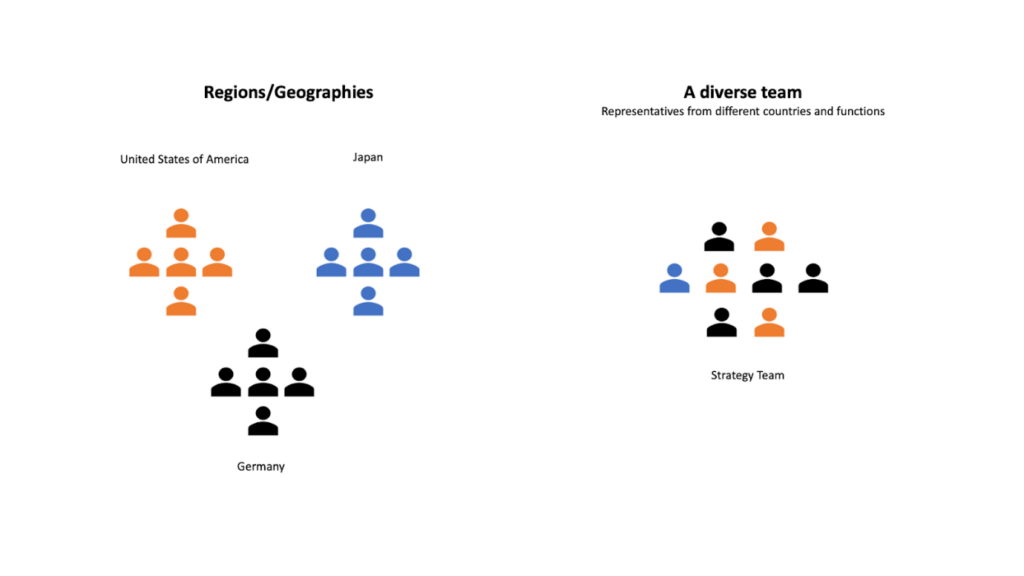While many of us commit to diversity and inclusion as part of our ethical business practice, we can also acknowledge that it is just good business sense. Diverse teams bring commercial success to a product or brand. Why? Because having choices matters, and with the diversity of teams comes diversity of thought.
I have worked on strategy with global pharmaceutical brands for the past 30 years and have learned that the more diverse the input, the greater the success of a new drug or therapy. Success is based on positive customer experience, and for that, we need to draw from as many varying perspectives as possible.
Having a diverse team participating in the development of strategy is one way of ensuring that you are going to be more successful at generating choices before you start making those choices.
What is a truly diverse team?
A diverse team is a cross-functional collection of individuals with varied skill sets from different areas of a business and varying backgrounds, collaborating to achieve a common goal.

Why are diverse teams essential for business success?
A diverse set of minds drawing from different experiences inspires teams to think about the choices they have differently and more creatively.
For example, in a pharmaceutical setting, the medical affairs team brings the knowledge of the data, the unmet need, and insight into clinical practice. But only members from the countries where the drugs will launch will be able to truly contribute social and economic observations relative to that region. We need women, minorities, and experts from all fields to share their experiences and knowledge of specific situations for a plan to work.
Cross-functional collaboration can help break down information silos, where teams fail to communicate freely or effectively with other departments.
Research suggests that working in silos and not sharing data with team members from other departments can cost a company close to $8000 per day in wasteful expenses.
But time is scarce: we need quick access to accurate and real-time insights to make effective business decisions. The real-time insight will come from those closest to the customer, so it is important for diverse members from different areas to contribute to the strategy.
For a business strategy to work, everyone must know the process, the plan, and how these came about. A diverse team can log personal experiences and use their collective knowledge to diversify the appeal of a product and analyse the wider customer base.
Benefits to the strategy of a diverse team include:
- Better Innovation & Creativity. Employees with diverse skill sets from varying backgrounds explore problems in different ways. When people working in different capacities come together, they think outside the box to produce significantly enhanced outcomes. It is a great way to create concepts that positively distinguish a business from its competitors.
- Achieving alignment to strategy across purposes and regions. Businesses are moving forward rapidly, and organisations are seeing possible competitors in areas they never knew existed. With so much choice about where to focus, you really want your workforce to align around one strategy. Underperformance is inevitable if everybody is off working in ten different directions, but a team brought together by shared and opposing experiences creates more fluidity of thought.
- Improving the customer experience: Creating an effective customer experience is about more than just ensuring your customers receive the products and services they desire in a timely and efficient manner. They also need to understand how a product works for them, whoever they are. This knowledge comes from testing on ‘real people’ and bringing as many opinions to the table as possible. Nobody interprets in exactly the same way. By reading the reactions of a diverse team and their friends and family, we are bringing in the widest array of opinions and receptions.
- Business Agility: Diverse teams are typically adaptable and flexible. They can help tackle any silo mentality and bridge gaps between team members. They can come together to consider new information or changes, adapt the strategy if necessary, or react to setbacks immediately. They are better placed to make decisions when problem-solving amidst uncertainty.
In summary, the rapidly changing environment and new information require separate departments to work together to bring the richest spectrum of experience to the table if a strategy is to prove successful.
Companies stand a better chance of creating a winning strategy if created by a socially and geographically diverse team. With every team member inputting their unique abilities and knowledge to the table, the strategy can only move from strength to strength over time.
It is important for team members to own their decisions and input and be valued for their unique insight or contribution. Digital strategy platforms like NMBLR can support diverse teams by offering an inclusive and structured process to facilitate a strategy discussion and allow people to bring forward ideas. They do this by:
Working against silos – The structure provided levels the playing field. The guidance provided equips people from different disciplines to contribute to the conversation and have their contributions acknowledged.
Eliminating repetitive efforts – Inputs appear where and when needed, and any edits are updated throughout the platform in real-time.
Decision-making transparency – By involving people from different backgrounds, people learn to understand the strengths of others. The visibility of who is saying what – which is enabled by a digital app – leads to every team member appreciating what their co-workers do, what their experience is, and where and how their contribution created value
Better engagement – Diverse collaboration ensures that not all ideas originate from the very few. It ensures that everyone on the team can participate in the creation of new ideas, which improves engagement on all fronts.
More innovative thinking – Creativity is a group process. Clear and crisp communication inspires sharing of ideas between diverse teams.
By Janice MacLennan, CEO at St Clair Consultancy and founder of the NMBLR strategy app









